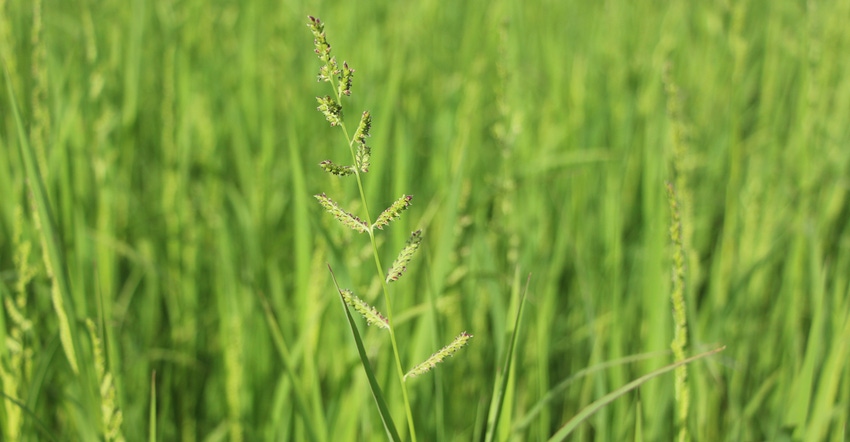March 1, 2018

Sponsored Content
Rice growers can add a new solution to their to their 2018 weed management programs. Now available, Loyant™ herbicide brings a new class of chemistry to the rice market with broad-spectrum control of grasses, broadleaves, sedges and aquatic weeds.
In 2017, a small number of rice producers and consultants participated in the Dow AgroSciences Field Forward™ program. The on-farm trial offered an opportunity to experience Loyant herbicide before it was commercially available.
Arkansas crop consultant Lance Ramthun assessed Loyant herbicide in the section of his grower’s field with the highest weed pressure. He’s glad he did.
The 5-acre plot that Ramthun calls “historically foul” was treated last April 17 with a per-acre rate of 10 ounces of Command herbicide and 5 ounces of NEWPATH herbicide.
On May 28, the field had one- to two-tiller barnyardgrass, four-leaf signalgrass, pigweed and morningglory. A weather-delayed treatment of 4 ounces of NEWPATH and 1 pint of Loyant was sprayed June 5. The field was flooded three days after the herbicide application.
“Since my young consultant days, I’ve been taught that when barnyardgrass puts on a tiller, you’re done. You might make it sick but you’re not going to kill it,” says Ramthun of Crop Solutions LLC in Jonesboro, Arkansas. “I joke that when the clock strikes midnight on May 31, we can’t kill weeds. It’s too hot for applications, there’s too much sunlight, and weeds grow exponentially compared to May. You just cannot get a good kill.
“I was happy to put Loyant to this kind of test because it was set up for failure given the timing, weed size and spectrum, especially with pigweed and barnyardgrass.”
Don’t be quick to judge
Ramthun’s general manager Jordan Hawkins went to inspect the trial three days after application when the permanent flood was established.
“Jordan called me and said, ‘It’s not going to work. I can’t tell a single thing. I don’t see any kind of symptomology.’ Two days later, Jordan called again and said, ‘I take back my initial assessment. I’ve never seen anything like this. That grass is exactly where it was. It still doesn’t look like it’s dead, but it’s floating on top of the water. I can reach down and break it off at the crown and it’s like glass. Everything is brittle. It’s done,” Ramthun recalls.
Ramthun says their experience offers a valuable lesson for others: Don’t judge the weed control activity of Loyant based on your experience with other herbicides.
“We were extremely impressed with the results. What it did to the pigweed in about 36 hours was amazing,” he says. “Due to extenuating circumstances, we had fresh levees with exposed tops — no rice or canopy to compete with weeds. I would have been happy if it killed one pigweed, but it controlled 95 percent of them.
“The field was clean of grasses. It’s tough to kill barnyardgrass in that field, but I’ve never been under the assumption that it was resistant — until this year. Our Loyant plot looked a whole lot better than our NEWPATH section did.”
Now a strong believer in the new weed control technology Loyant™ herbicide offers, Ramthun plans to recommend it in a broad range of situations.
“It’s something that we need tremendously. I am hoping we can program it into a rice herbicide portfolio to make our operations and applications more effective,” he says.
For more information visit LoyantProtects.com.
™ Loyant and Field Forward are trademarks of The Dow Chemical Company (“Dow”) or an affiliated company of Dow. Loyant is not registered for sale or use in all states. Contact your state pesticide regulatory agency to determine if a product is registered for sale or use in your state. Always read and follow label directions. ©2018 Dow AgroSciences LLC
About the Author(s)
You May Also Like




